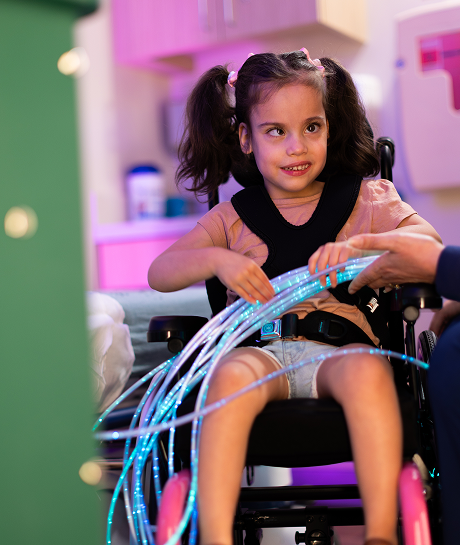neurosurgery


service overview
The neurosurgery team at Dayton Children’s provides specialized, multidisciplinary care for children with conditions affecting the brain, spinal cord and peripheral nerves. Families who depend on our neurosurgical team know they are in good hands and that our specialists will be able to address whatever needs arise.
Each of our neurosurgeons is fellowship trained, with extensive experience in performing complex procedures, and has on average 20 years of experience. They take a conservative approach, pursuing non-surgical and minimally invasive techniques whenever possible. The neurosurgeons at Dayton Children’s also have experience performing surgeries that are only done by a few pediatric physicians nationwide and make it a goal to continue bringing the latest neurosurgical techniques and technology to Dayton Children’s as soon as they become available.Our pediatric neurosurgery team is here to help. Schedule an appointment online or call 937-641-4000.
our neurosurgery specialists
Our pediatric neurosurgeons are fellowship-trained specialists with decades of experience treating conditions that affect the brain, spine, and nervous system. Known for their skill in complex procedures—and their commitment to using non-surgical or minimally invasive options whenever possible—they offer advanced, personalized care for every child. They work closely with a dedicated team of advanced practice providers who help ensure seamless, family-centered care throughout each step of the journey.
- Kambiz Kamian, MD, FRCSC, FAANS — Division Chief, Neurosurgery
- Shobhan Vachhrajani, MD, PhD, FRCSC — Neurosurgery
- Rob Lober, MD, PhD, FAANS — Neurosurgery
- Joseph Day, MPAS, PA-C — Neurosurgery
- Hilary Williamson, PA-C — Neurosurgery
conditions we treat
Our experienced pediatric neurosurgeons perform complex surgeries for conditions of the brain, spinal cord and peripheral nerves.
- Brachial plexus injuries
- Brain and spinal cord tumors
- Canavan disease
- Cerebral cysts
- Cerebral Palsy (CP)
- Chiari malformation
- Concussions
- Craniofacial malformations
- Craniosynostosis
- Disc pathology
- Epilepsy
- Fetal conditions
- Hydrocephalus
- Hydrocephalus
- Intraventricular hemorrhage
- Jackson-Weiss syndrome
- Neural tube defects
- Neuro-endocrine problems
- Peripheral nerve damage (acute and chronic injuries)
- Positional plagiocephaly
- Pseudotumor Cerebri
- Spina bifida (myelomeningocele)
- Tethered spinal cord
- Trauma injuries
- Tuberous sclerosis
- Vascular disorders
services and programs
Our neurosurgeons collaborate with other specialists at the hospital to ensure that each child receives comprehensive, coordinated care. These specialists can include neurologists, emergency medicine physicians, neonatologists, maternal-medicine specialists, oncologists, genetic counselors, rehabilitation therapists and many more.
Dayton Children’s also participates in research studies with Miami Valley Hospital’s neurosurgery department as part of the Wright State University and Premier Health Neuroscience Institute. This means patients and families have opportunities to participate in research studies designed to enhance neurosurgical care.
Learn more about our services and programs:
Our multidisciplinary craniofacial program includes plastic surgeons, neurosurgeons, neuro-ophthalmologists and advanced pediatric ENT specialists. We treat both simple and complex craniosynostosis and multi-suture synostoses.
In some cases, a routine prenatal ultrasound reveals problems that may require surgery soon after birth. When this is the case, a pediatric neurosurgeon can have a prenatal consultation with the mother to discuss what is ahead and how to prepare. Newborns who need surgery are transferred from the birthing hospital to Dayton Children’s soon after delivery. Our specially trained surgeons use the most advanced surgical equipment to perform complex procedures. These services are provided to families through The Fetal to Newborn Care Center. This center provides a nurse navigator to help expectant mothers through the complex medical system when diagnosed with a fetal condition. Learn more about this program at fetaltonewborn.org.
Dayton Children’s neurosurgeons have extensive experience in performing minimally invasive surgeries, sometimes called microsurgeries. This is an alternative to open surgeries, and can involve using the most advanced endoscopic procedures, laser technology and high-frequency ultrasound. Benefits include faster healing, less pain, less scarring and quicker recovery.
Peripheral nerve surgery is performed for patients suffering from a nerve injury, compression and entrapment or a tumor. Dr. Kamian is one of only a few neurosurgeons in the entire country who has expertise in peripheral nerve surgeries and the only one in our area.
Imaging technology such as magnetic resonance imaging (MRI) and ultrasound helps our pediatric neurosurgeons see detailed structures of the brain and spine during surgery. This type of “image-guided,” or stereotactic, surgery allows them to navigate to remote parts of the brain and avoid structures that can affect functions such as speech and movement.
Selective Dorsal Rhizotomy (SDR) is a surgical procedure used to reduce muscle stiffness, also known as spasticity, in patients with conditions like cerebral palsy. Spasticity is caused by abnormal communication between the brain, spinal cord, nerves and muscles. SDR aims to improve mobility, function and quality of life by selectively cutting nerve rootlets in the spinal cord that are sending abnormal signals to the muscles. SDR is often used when other treatments, like physical therapy or medicine, have not been effective enough.
Our team treats patients suffering from spinal column/cord injuries or complex congenital anomalies. We work together with our orthopedic surgeons to ensure our patients receive the best care possible.
Tumors of the brain and spine require a different approach to care. Children who are diagnosed with these tumors are at higher risk for behavior and personality changes, as well as learning difficulties, as a result of the tumor or treatment. Dayton Children’s neuro-oncology team includes a hematologist/oncologist, neurosurgeon, endocrinologist, nurse coordinator, psychologist and social worker, who work together to make sure each child’s needs are met. Approximately 70 percent of new patients seen by the neuro-oncology program at Dayton Children’s each year require surgery to treat their tumor.
Dayton Children’s is a Level I pediatric trauma center. Neurosurgeons are on-call 24/7 and are prepared to treat any patients who may come to the emergency and trauma center with a head injury.
Dayton Children’s offers vagal nerve stimulation (VNS), a minimally invasive therapy for patients with epilepsy. Dr. Kamian is among the first in the country to use the latest FDA-approved technology to help children control drug-resistant epilepsy. The AspireSR 106 generator for the Vagal Nerve Stimulation Therapy System is the first and only system to gauge heart rate increases that often precede a seizure and send the stimulation to stop that seizure, without any action required from the patient or caregivers. This improves the quality of life for children with multiple seizures a day, those who can’t communicate or move well or children who have seizures while sleeping.
news and blogs
Stay up-to-date with the latest insights from Dayton Children’s Hospital. We’re always working to share helpful, real-world content for families navigating neurosurgery care.
patient stories
Facing the possibility of neurosurgery for your child can be overwhelming and scary. But you’re not alone. Hearing from other families who’ve been through similar experiences—and knowing you have a trusted care team by your side—can make all the difference. Our patient stories highlight real journeys from parents and children who’ve faced tough moments, found answers, and started to heal. Explore how Dayton Children’s neurosurgery care has gone above and beyond for kids just like yours.
for your visit
Explore the sections on this page to help you prepare for your next appointment.
You can also visit these popular pages for more information:
resources – neurosurgery
Other organizations can offer educational materials for patients and families. Our specialists encourage families to find support through the Hydrocephalus Association and National Institute of Neurological Disorders and Stroke.
hours & locations – neurosurgery
here when you need us
Whether you’re looking for the right provider, ready to make an appointment, or need care right now—we’re here to help you take the next step with confidence.
